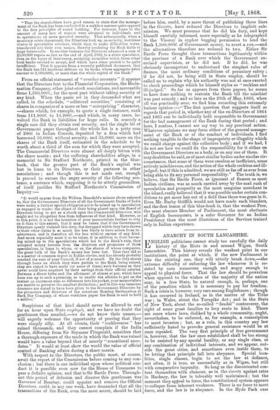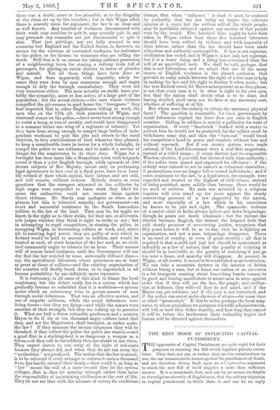ANARCHY IN SOUTH LANCASHIRE.
ENGLISH politicians cannot study too carefully the daily history of the Riots in and around Wigan, South Lancashire. This history reveals the weakest point in our institutions, the point at which, if the new Parliament is like the existing one, they will utterly break down,—the extreme difficulty of enforcing the law whenever it is re- sisted by men numerous enough and angry enough to appeal to physical force. That the law should be powerless when opposed to the wishes of the majority of the nation may, in a free State, be natural enough, is, perhaps, one of the penalties which it is necessary to pay for freedom. Such a crisis is, however, very rare among Englishmen ; though it has occurred in Ireland, as in the matter of the Tithe war ; in Wales, about the Turnpike Act ; and in the State of New York, about the so-called " feudal" controversy, the right of some great families to levy rents in kind. There are cases where laws, disliked by a whole community, ought, nevertheless, to be enforced, as, for example, a conscription to meet invasion ; but, as a rule, in this country any law sufficiently hated to provoke general resistance would be at once repealed. The very first principle of free government is, however, that the law once established shall be too strong to be resisted by any special locality, or any single class, or any combination of individual interests, and we appear, out- side the great cities, and sometimes even inside them, to be letting that principle fall into abeyance. Special loca- lities, single classes, begin to set the law at defiance, not often, it is true, so successfully as in Wigan, but still with comparative impunity. So long as the discontented con- tent themselves with clamour, as in the dmeute against rates in Hackney, the law is tolerably well maintained ; but the moment they appeal to force, the constitutional system appears to collapse from inherent weakness. There is no force to meet force, and the law is in abeyance. In the Hyde Park case
there was a doubt, more or less plausible, as to the illegality of the claim set up by the invaders ; but in this Wigan affair there is scarcely room for argument, the law is so clear and so well known. Any number of workmen discontented with their work may combine to quit it, may actually quit it, and may persuade any comrades not yet discontented to quit it also. That just privilege, not yet fully secured in any countries but England and the United States, is, however, no excuse for the coercion of contented workmen, for resistance to the police, or for threats to witnesses who are telling the truth. Still less is it an excuse for taking military possession of a neighbouring town, for stoning a railway train full of passengers, for placing an entire district in terror of plunder and assault. Yet all these things have been done at Wigan, and done apparently with impunity, solely be- cause they were done by men numerous enough and angry enough to defy the borough constabulary. They were not very numerous either. The men actually on strike have pro- bably the sympathy, more or less active, of a large part of the population ; but the actual rioters, the men whose violence compelled the pit-owners to send home the " foreigners " they had imported, that is, other Englishmen willing to work, the men who on the 17th ult. took possession of Wigan, and showered stones on the police,—have never been strong enough to resist a troop or two of cavalry, and would have disappeared in a moment before one wing of a regiment of infantry. Yet they have been strong enough to compel large bodies of inde- pendent workmen to quit the pits and return to the rural districts, to levy contributions of food wherever they pleased, to keep a considerable town in terror for a whole fortnight, to compel the police to use cutlasses, and to make it a service of danger for the magistrates to do their duty. Wigan for a fortnight has been more like a Neapolitan town with brigands round it than a quiet English borough, while upwards of 500 decent subjects of Her Majesty, intent only on performing legal agreements to hew coal at a fixed price, have been forci- bly robbed of their whole capital, their labour, and are still, and will remain, without redress. Nobody denies, or even questions that the strangers attracted to the collieries by high wages were compelled to leave work they liked be- cause the authorities could not ensure them against direct violence. Mr. Hardy may apologize as often as he pleases, but this is tolerated anarchy, not government—an overt and successful resistance by the South Lancashire colliers to the law of the land. They may be, for aught we know, in the right as to their strike, for they are, at all events, sole judges whether they think it right to strike or not ; but in attempting to expel competitors, in stoning the police, in occupying Wigan, in threatening colliers at work, and, above all, in resisting legal arrest, they are guilty of acts which in Ireland would be held to amount to sedition, and would be treated as such, of overt breaches of the law such as no civil- ized community ought to tolerate for an hour. Their success will of course breed imitators, until the Government will one day find the law resisted by some universally diffused class— say, the agricultural labourers, whose grievances are at least as great as those of colliers—and the existing organization of the counties will finally break down, to be superseded, in all human probability, by one infinitely more repressive.
It is customary, in all cases of this kind, to blame the local magistracy, but the defect really lies in a system which has gradually become so enfeebled that it is worthless—a system under which an aristocracy tries to govern masses of men through social deferences. That was an effective system, and one of singular mildness, while the social deferences were living forces—but they are dying—and while the masses were unaware of their strength, but they are waking up to perceive it. What are half a dozen estimable gentlemen and a country Mayor to do, if six or ten thousand angry colliers insist that they, and not the Magistrates, shall interpret, or rather make, the law ? If they summon the income taxpayers they will be thrashed, if they collect the police the police are stoned,—and a good flint in a stocking-heel is as dangerous a weapon as a baton,—if they call in the soldiery they are afraid to use them. They expect rioters to run away at the sight of red-coats because they always did, and when they do not run away the " authorities " are paralyzed. The notion that the law is sacred, is to be enforced if every attempt to enforce it costs a thousand lives, has hardly entered their heads,—how could it, as long as "law " meant the will of a caste ?—and they let the system collapse, that is, they let anarchy triumph rather than incur the responsibility of maintaining civilization at the cost of life. They do not see that with the advance of society its conditions change, that when "influence " is dead it must be replaced by authority, that the law being no longer the concrete opinion of a caste, but the written will of the whole people, may be justifiably enforced against any section of that people even by the sword. Five hundred lives ought to have been taken in Wigan rather than those five hundred labourers should have been robbed by violence and with impunity of their labour, rather than the law should have been made ridiculous and authority contemptible. If law is not supreme, civilization has ended, and in Wigan it is not only not supreme, but it is a lower thing, and a thing less reverenced than the will of an uncivilized mob. We shall be told, perhaps, that
this is not Liberalism, and we admit that one of the many causes of English weakness is the absurd confusion that
prevails in many minds between the right of a free man to help in making the law, and his right to disobey it when made ; but the true Radical creed, let Tories misrepresent us as they please, is not that every man is to do what is right in his own eyes, but that the nation shall decide what is to be done, and having decided, shall carry out its laws at any necessary cost, whether of suffering or of life.
But where were the orderly to obtain the necessary physical' force ? The question is reasonable, for since government by social deferences expired the force does not exist in English counties. Calling in soldiers is merely a palliative for want of organization. If every " knobstick " worked with a sentry to protect him he would not be protected, for the soldier must be withdrawn some day, and then the " turn-out " would break his competitor's head in peace and comfort, without fear and without reproach. But if our county system were made rational, if the Lord-Lieutenant were a real first magistrate, instead of a titled image ; if every district had its responsible Warden, elective, if you will, but invested with clear authority ; if the police were armed and organized for efficiency ; if the orderly were trained to act in concert as volunteer constables ; if prosecutions were no longer left to cowed individuals ; and if overt resistance to the law, to a legal arrest, for example, were regarded and treated as the highest of civil crimes, instead of being punished more mildly than larceny, there would be no need of soldiers. No man not actuated by a religious impulse will ever stand up for years against the steady unswerving pressure of a law supported by the nation, and most especially of a law which in his conscience he knows to be just and right. The spasmodic violence of a native chief in India always fails to put down brigandage, though he pours out death wholesale ; but the instant the district becomes English, the instant the brigand feels that cold steady pressure of unswerving justice, recognizes that fifty years hence it will be as to-day, that he is fighting an organization, and not a man, brigandage disappears. There is no need of cruelty, or even of great severity ; all that is required is that a mild and just law should be maintained as inflexibly as a law of nature, that the penalty of violating it should be as inevitable as the penalty of scorching if you go too near a flame, and anarchy will disappear. At present, in Wigan, at all events, it seems to be established as an institution.
We can take a mountain fortress in the interior of Africa without losing a man, but at home our notion of an executive is a fat bourgeois running about beseeching frantic women to be good, and issuing manifestoes to assure men in arms against order that if they will set the law, the people, and civiliza- tion at defiance, they will—if they do not mind, and if the Mayor can get evidence, and if the jury is not terrorized, and if the police can arrest under showers of stones—be some time or other "prosecuted." If this be order, perhaps the local mag- nates, to whose prejudices we postpone scientific administration, will tell us how they define anarchy, and how long they expect it will be before the lawlessness their imbecility begets and fosters will be directed against themselves.



































 Previous page
Previous page